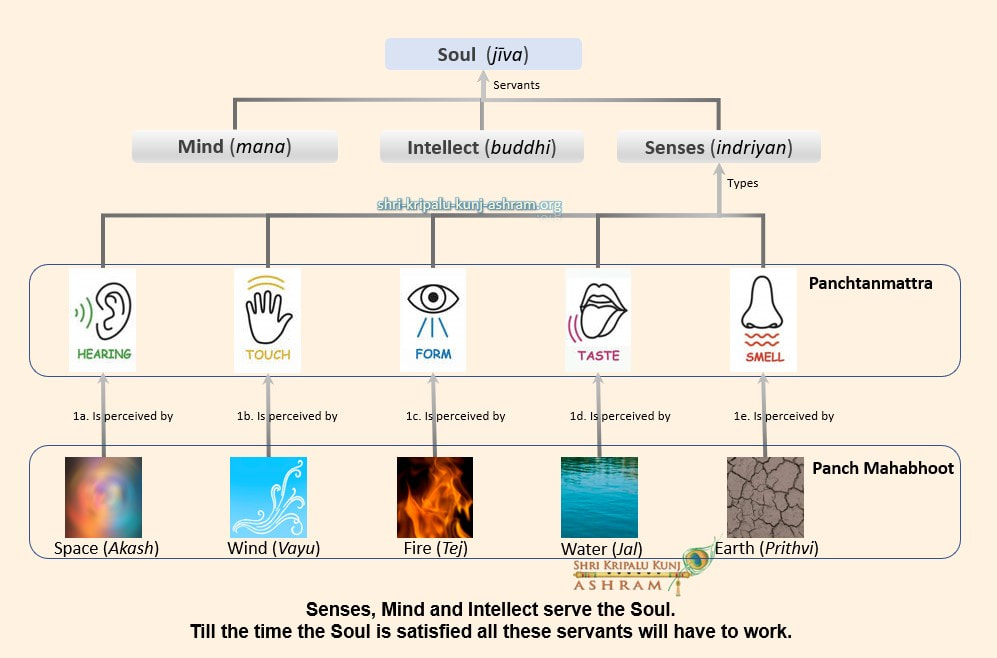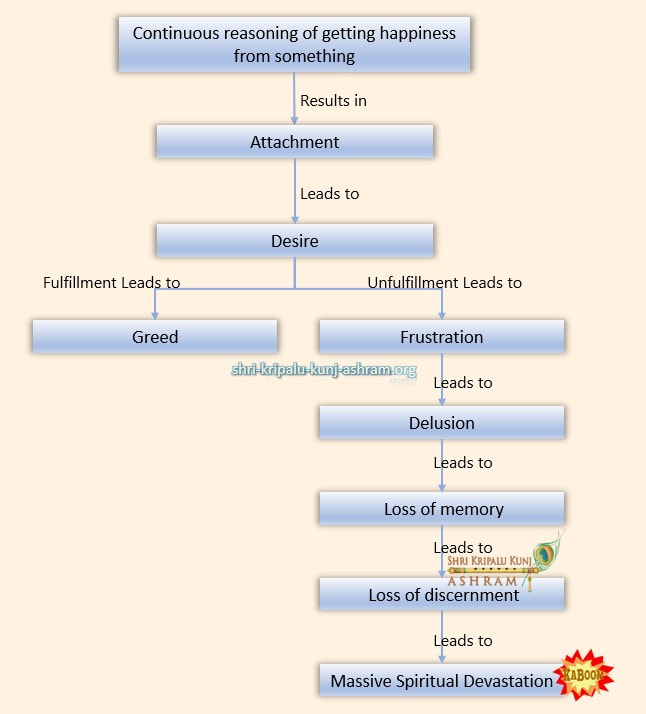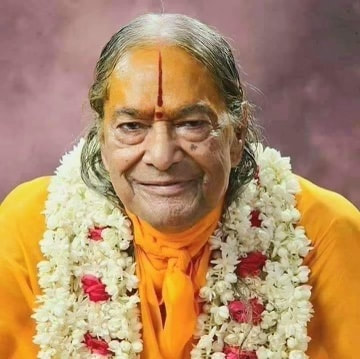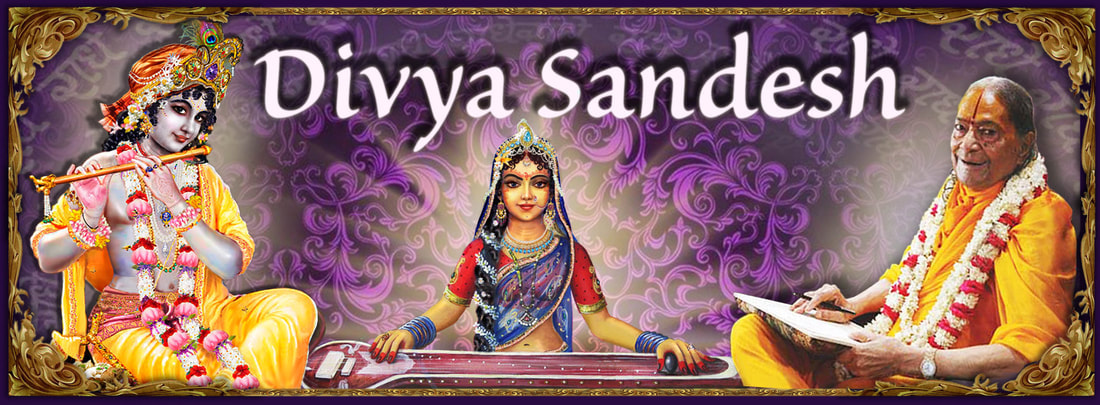Why does the mind create desires? |
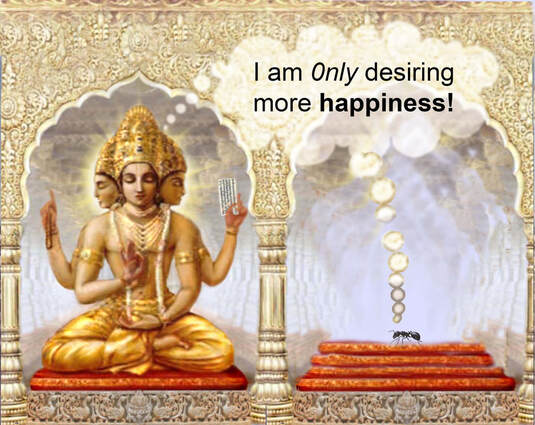 Whether it's an insignificant ant or the creator Lord Brahma, all the souls have only one desire - attainment of Bliss
Whether it's an insignificant ant or the creator Lord Brahma, all the souls have only one desire - attainment of Bliss
Upon deep contemplation it is understood every living being from a small ant to the creator Lord Brahma desires to attain bliss. Furthermore, it is understood that desire is not an acquired habit but our innate nature.
Through every action that we perform, our one and only objective is to attain bliss , although the actions may appear contradictory.
This natural desire to attain bliss is constant and continuous but unfortunately the jeev doesn't know the real definition of bliss and hence the path to achieve it. In the absence of that crucial knowledge, the jeev develops numerous desires for material objects with the objective of deriving bliss from the attainment of those objects. Some of those desires get fulfilled while others don’t but in either case the dissatisfaction, discontentment and discord continue to stay as is. The truth is that this situation will not change until the jeev attains what it truly desires. So let us delve deeper into what the jeev truly desires and why. And after understanding that, let us understand how can jeev get what it is looking for?
All desires e.g., the desire to see, hear, smell, taste and touch can be classified into five categories, corresponding to each gyanendriyan (five sense) e.g., sight, hearing, smell, taste and touch, that is used to experience the fulfillment of that desire. Some people assert that they don't desire for any subjects of the senses; instead they desire for things like endless, life, endless knowledge, dominion over others, wealth, fame, freedom. Even those things are enjoyed via the senses for example hearing praise from others about the promotion, enjoying more expensive products and feeling proud of one's own knowledge seeing others admiring it.
However, no matter how much matter is given to these senses, the desire for more never never seems to get satisfied. E.g. The eyes want to see the most beautiful sights thing to experience bliss. The tongue wants to taste the most delicious delicacies to experience the bliss of taste. Likewise, all other senses constantly desire their respective subjects to attain that unlimited eternal bliss - a bliss so great that all other kinds of bliss seem trivial in comparison. Unaware of the limitation that Saint Tulsi Das ji has described in the verse below, we naively aspire to get unsurpassable bliss from material objects.
Through every action that we perform, our one and only objective is to attain bliss , although the actions may appear contradictory.
This natural desire to attain bliss is constant and continuous but unfortunately the jeev doesn't know the real definition of bliss and hence the path to achieve it. In the absence of that crucial knowledge, the jeev develops numerous desires for material objects with the objective of deriving bliss from the attainment of those objects. Some of those desires get fulfilled while others don’t but in either case the dissatisfaction, discontentment and discord continue to stay as is. The truth is that this situation will not change until the jeev attains what it truly desires. So let us delve deeper into what the jeev truly desires and why. And after understanding that, let us understand how can jeev get what it is looking for?
All desires e.g., the desire to see, hear, smell, taste and touch can be classified into five categories, corresponding to each gyanendriyan (five sense) e.g., sight, hearing, smell, taste and touch, that is used to experience the fulfillment of that desire. Some people assert that they don't desire for any subjects of the senses; instead they desire for things like endless, life, endless knowledge, dominion over others, wealth, fame, freedom. Even those things are enjoyed via the senses for example hearing praise from others about the promotion, enjoying more expensive products and feeling proud of one's own knowledge seeing others admiring it.
However, no matter how much matter is given to these senses, the desire for more never never seems to get satisfied. E.g. The eyes want to see the most beautiful sights thing to experience bliss. The tongue wants to taste the most delicious delicacies to experience the bliss of taste. Likewise, all other senses constantly desire their respective subjects to attain that unlimited eternal bliss - a bliss so great that all other kinds of bliss seem trivial in comparison. Unaware of the limitation that Saint Tulsi Das ji has described in the verse below, we naively aspire to get unsurpassable bliss from material objects.
गो गोचर जहँ लगि मन जाई । सो सब माया जानेहु भाई ॥
go gochar jahan lagi man jaee | so sab maaya jaanehu bhaee ||
go gochar jahan lagi man jaee | so sab maaya jaanehu bhaee ||
"The reach of the senses, mind and intellect is limited to the material realm only" because they are created by Maya from Panchtanmattra (1).
At this point let us examine whom are these senses trying to please?
Since this topic is beyond the reach of the mind and intellect, we will have to seek clarifications from the scriptures. As you have heard numerous times, Brahma-Supreme God is Bliss and jeev is an eternal sentient part of Bliss. Being a part of Bliss, jeev naturally seeks to become one with its whole and hence seeks God. The senses, mind and intellect are eternal servants of jeev and thus work incessantly to please the jeev. Jeev is divine and hence does not derive pleasure from material objects and never will. It is for this very reason that since eternity, having experienced numerous pleasures through the gyanendriyan (five senses), the jeev continues to look for Bliss.
Ved Vyas asserts –
यत्पृथिव्यां व्रीहि यवं हिरण्यं पशवस्त्रियः।
नालमेकस्य पर्याप्तं तस्मात्तृष्णां परित्यजेत् ।।
नालमेकस्य पर्याप्तं तस्मात्तृष्णां परित्यजेत् ।।
भागवत
Yatpr̥thivyāṁ vrīhi yavaṁ hiraṇyaṁ paśavastriyaḥ ।
Nālamēkasya paryāptaṁ tasmāttr̥ṣṇāṁ parityajēt॥
Nālamēkasya paryāptaṁ tasmāttr̥ṣṇāṁ parityajēt॥
Bhāgwat
|
"If the entire earth with all of its wealth and resources was given to one person, then too the person's desires will remain as unfulfilled as they are today".
The Jeev continues to seek divine bliss. It derives no trace of happiness in any material matter. But it is the intellect that will have to come to the realization that seeking happiness in the inert and insipid world is like churning limewater in anticipation of getting butter out of it. Continued effort in this area is simply a waste of time. So, it is the intellect that has decided there is bliss in material objects and hence continues to inspire the mind-senses to acquire material matter. However, since the acquisition of the desired object does not satisfy the innate desire of attaining happiness, a desire for acquiring another material object is instantly created, ultimately leading to greed. |
On the other hand, if the material object cannot be attained, it gives rise to anger. Both situations give rise to many other mental diseases like anger (2), passion, enmity, repulsion, etc (3). The sooner our intellect comprehends the fact that there is no happiness in this material world, the sooner the mad race to acquire the objects of the world will cease to exist.
The Gita asserts -
The Gita asserts -
ध्यायतो विषयान्पुंस: सङ्गस्तेषूपजायते |
सङ्गात्सञ्जायते काम: कामात्क्रोधोऽभिजायते ॥ 2.62॥
dhyāyato viṣhayān puṁsaḥ saṅgas teṣhūpajāyate
saṅgāt sañjāyate kāmaḥ kāmāt krodho ’bhijāyate BG 2.62
सङ्गात्सञ्जायते काम: कामात्क्रोधोऽभिजायते ॥ 2.62॥
dhyāyato viṣhayān puṁsaḥ saṅgas teṣhūpajāyate
saṅgāt sañjāyate kāmaḥ kāmāt krodho ’bhijāyate BG 2.62
“While contemplating on the objects of the senses, one develops attachment to them. Attachment leads to desire, and from desire arises anger.” Mind constantly contemplates on the material objects hence the desire for acquiring it gets generated.
क्रोधाद्भवति सम्मोह: सम्मोहात्स्मृतिविभ्रम: |
स्मृतिभ्रंशाद् बुद्धिनाशो बुद्धिनाशात्प्रणश्यति || 2.63||
krodhād bhavati sammohaḥ sammohāt smṛiti-vibhramaḥ
smṛiti-bhranśhād buddhi-nāśho buddhi-nāśhāt praṇaśhyati BG 2.63
स्मृतिभ्रंशाद् बुद्धिनाशो बुद्धिनाशात्प्रणश्यति || 2.63||
krodhād bhavati sammohaḥ sammohāt smṛiti-vibhramaḥ
smṛiti-bhranśhād buddhi-nāśho buddhi-nāśhāt praṇaśhyati BG 2.63
“Anger clouds our judgment, resulting in bewilderment of memory. When the memory is bewildered, the intellect gets destroyed; and when the intellect is destroyed, it results in one’s downfall”.
This lack of satisfaction even after acquiring the objects of material desires results in an ongoing cycle of innumerable desires for each sense.
कुरङ्ग मातङ्ग पतङ्ग भृङ्ग. मीनाः हताः पंचभिरेव पञ्च।
एकःप्रमादी स कथं न हन्यते यः सेवते पंचभिरेव पञ्च॥
kuraṅga mātaṅga pataṅga bhṛṅga. mīnāḥ hatāḥ paṃcabhireva pañca।
ekaḥpramādī sa kathaṃ na hanyate yaḥ sevate paṃcabhireva pañca॥
एकःप्रमादी स कथं न हन्यते यः सेवते पंचभिरेव पञ्च॥
kuraṅga mātaṅga pataṅga bhṛṅga. mīnāḥ hatāḥ paṃcabhireva pañca।
ekaḥpramādī sa kathaṃ na hanyate yaḥ sevate paṃcabhireva pañca॥
“The deer loves the music, an elephant is attracted to touch, a moth is attracted to light, a bumble bee is attached to the fragrance of lotus flower and a fish is attached to the subject of tongue. Each of these is attracted to the subject of merely one sense and that attraction leads them to death*. Imagine the plight of the human beings, who have countless desires pertaining to each sense?”
*Hunter plays the music to attract deer, a hunter deceives an elephant by placing a female elephant as a bait in a pit, moth approaches the fire and gets killed, a bumble bee sits in lotus to smell the fragrance and an elephant comes and eats the flower, a fish gets attracted to the bait used by the fisherman and gets killed.
Conclusion
 Is abandoning desires the solution to acquiring bliss?
Is abandoning desires the solution to acquiring bliss?
Constant contemplation of any material object creates a desire for the same object called āsakti (आसक्ति) in that object. The process of acquiring that material object is ridden with misery; the acquisition of that object leads to greed and non-acquisition leads to anger. So, desire is the cause of all miseries.
So what is the solution to acquiring bliss? Is it to abandon all desires? But that is unnatural! So what should be done?
The answer will be published in the next edition.
So what is the solution to acquiring bliss? Is it to abandon all desires? But that is unnatural! So what should be done?
The answer will be published in the next edition.
If you enjoyed this one, you might also like
|
हम कामना न करें तो बात बन जाएगी ? हाँ । लेकिन कामना करनी पड़ेगी । क्यों? क्योंकि हम आनंद ब्रह्म के अंश हैं ।
- जगद्गुरूत्तम स्वामि श्री कृपालु जी महाराज
(वास्तविक भक्ति - प्रवचन श्रृंखला) Can we attain the goal by just not making any desires? Yes. But we will have to make desires. Why? Because we are a part of Brahm, The ONE who is the embodiment of divine bliss (and every part naturally wants to be whole).
- Jagadguruttam Shri Kripalu Maharaj
(Vastavik Bhakti - speech series) |
Some Pointers to Explore our Literature
Indulge yourself in spiritual material - Click on the images below or the headers
Divya Sandesh
|
Divya Ras Bindu
|
Spiritual TermsDeepen your understandingKnow the real meanings of scriptural words
|
|
We would love to hear from you. Please
|
To get notification about our publications please subscribe by entering the information above
|
If you enjoyed this one, you might also like



